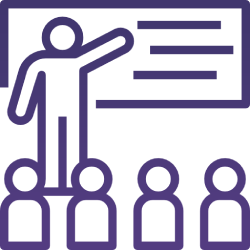Please Note: You can book this course and hold it in credit until you have decided on a specific course date. Alternatively, please view our other course dates
Please Note: You can book this course and hold it in credit until you have decided on a specific course date. Alternatively, please view our other course dates
Our Microsoft Azure Fundamentals training course will teach you to be proficient in the following:
Our Microsoft Azure Fundamentals training course covers the following Modules:
Module 1: Cloud computing
This module covers cloud computing, cloud concepts, deployment models, and understanding shared responsibility in the cloud.
Upon completion of this module, you will be able to:
Module 2: Benefits of using cloud services
This module introduces you to the benefits cloud computing can offer you or your organisation. Upon completion of this module, you will be able to:
Module 3: Cloud service types
This module covers the different cloud service types and shares some of the use cases and benefits aligned with each service type.
Upon completion of this module, you'll be able to:
Module 4: Describe the core architectural components of Azure
This module explains the basic infrastructure components of Microsoft Azure. You'll learn about the physical infrastructure, how resources are managed, and have a chance to create an Azure resource. Upon completion of this module, you will be able to:
Module 5: Describe Azure compute and networking services
This module focuses on some of the computer services and networking services available within Azure.
Upon completion of this module, you'll be able to:
Module 6: Azure storage services
This module introduces you to storage in Azure, including things such as different types of storage and how a distributed infrastructure can make your data more resilient.
Upon completion of this module, you will be able to:
Module 7: Describe Azure identity, access, and security
This module covers some of the authorisation and authentication methods available with Azure.
By the end of this module, you will be able to:
Module 8: Describe cost management in Azure
This module explores methods to estimate, track, and manage costs in Azure.
By the end of this module, you will be able to:
Module 9: Describe features and tools in Azure for governance and compliance
This module introduces you to tools that can help with governance and compliance within Azure.
By the end of this module, you will be able to:
Module 10: Describe features and tools for managing and deploying Azure resources
This module covers tools that help you manage your Azure and on-premises resources.
By the end of this module, you will be able to:
Module 11: Describe monitoring tools in Azure
This module covers tools that you can use to monitor your Azure environment.
By the end of this module, you will be able to:
Our Microsoft Azure Fundamentals training course will benefit several individuals and organisations, including but not limited to:
Our Microsoft Azure Fundamentals training course includes the following:
There are no entry-level requirements for our Microsoft Azure Fundamentals training course.
There is no recommended reading for our Microsoft Azure Fundamentals training course.
Microsoft Azure Fundamentals Examination:
The MOC exam voucher is included in the cost of this Microsoft Azure Fundamentals training course.
Our four-day Microsoft Azure Administrator training course teaches IT Professionals how to manage their Azure subscriptions, secure identities, administer the infrastructure, configure virtual networking, connect Azure and on-premises sites, manage network traffic, implement storage solutions, create and scale virtual machines, implement web apps and containers, back up and share data, and monitor your solution.
Our Microsoft Azure Fundamentals training course offers several benefits to individuals and organisations. Included but not limited to:
INFORMATION

All of our trainers have achieved exceptionally high delegate pass rates for accredited examinations for all our courses. We also offer complimentary pre and post-course support for any questions you may have.

We try and be as flexible as we can and accommodate your needs. We can swap delegates at any time with no charge. We can also create bespoke content should this be required.

We specialise in IT Service and Project Management. All of our Trainers and Consultants have considerable years of hands-on experience in IT Service / Project Management, working across a wide number of industry sectors.

Our training, sales and admin staff are all professional, helpful, friendly and approachable. We believe in providing excellent customer service. You will always have a dedicated friendly Account Manager